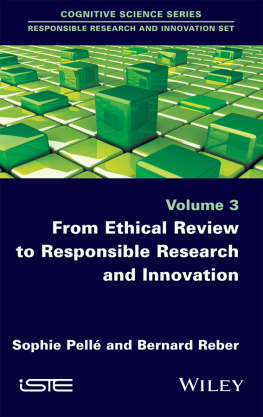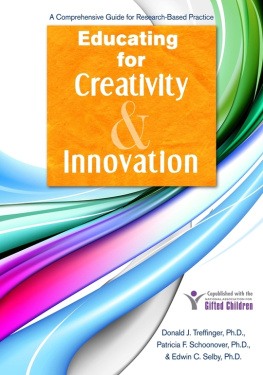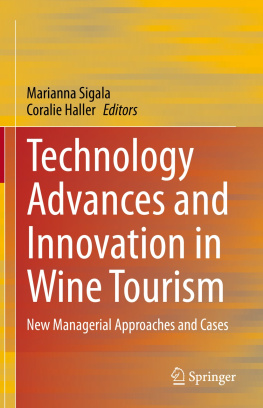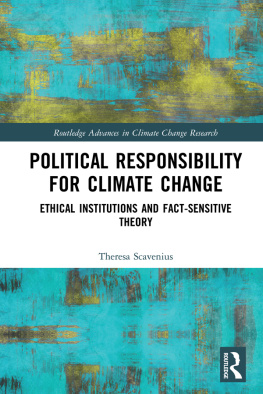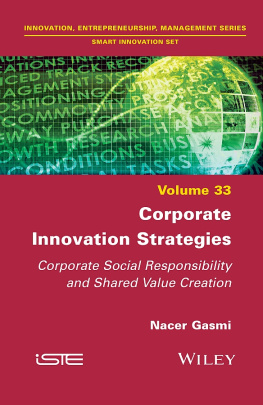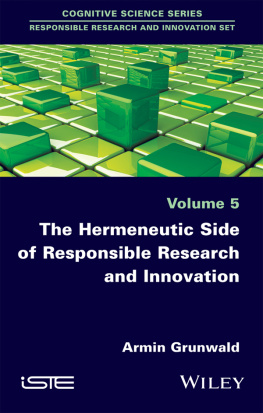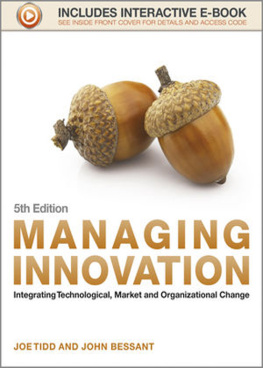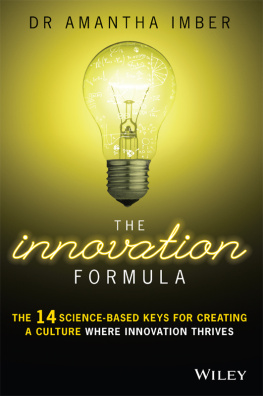
Table of Contents
Guide
Pages
Responsible Research and Innovation Set
coordinated by
Bernard Reber
Volume 3
From Ethical Review to Responsible Research and Innovation
First published 2016 in Great Britain and the United States by ISTE Ltd and John Wiley & Sons, Inc.
Apart from any fair dealing for the purposes of research or private study, or criticism or review, as permitted under the Copyright, Designs and Patents Act 1988, this publication may only be reproduced, stored or transmitted, in any form or by any means, with the prior permission in writing of the publishers, or in the case of reprographic reproduction in accordance with the terms and licenses issued by the CLA. Enquiries concerning reproduction outside these terms should be sent to the publishers at the undermentioned address:
ISTE Ltd
27-37 St Georges Road
London SW19 4EU
UK
www.iste.co.uk
John Wiley & Sons, Inc.
111 River Street
Hoboken, NJ 07030
USA
www.wiley.com
ISTE Ltd 2016
The rights of Sophie Pell and Bernard Reber to be identified as the author of this work have been asserted by them in accordance with the Copyright, Designs and Patents Act 1988.
Library of Congress Control Number: 2016939776
British Library Cataloguing-in-Publication Data
A CIP record for this book is available from the British Library
ISBN 978-1-84821-915-1
Foreword
The third volume of this set of books continues with the reflection initiated on responsible research and innovation (RRI). Several aspects make it different from the previous two. Firstly, it presents several case studies: research projects, an inclusive assessment for the evaluation of controversial technologies to sociopolitical experiences recruiting up to 126 European citizens to evaluate whether research on the brain should be promoted or avoided. Offering a strong philosophical consideration (both political and moral philosophy), it provides one of the most comprehensive descriptions to date of works on RRI. Project GREAT is considered to be one of the most highly theoretical projects among those funded to compile good practices with regard to RRI across the world and to outline guidelines and indicators. This work is therefore favorable toward human and social sciences (HSS) since few philosophical works focus on this new concept. This series has attempted to convene major philosophers working on RRI following a variety of approaches expected to be as broad as possible.
This volume follows an analytical philosophical perspective and has attempted to structure RRI secondary research fields since they already proceed with a critical view or defend under different formulations the way it is briefly stated in research policy documents.
The structure chosen, which is also an originality of the book, directly reflects responsibility, much like the famous phenomenological invitation of Husserl and Merleau-Ponty to go to the things themselves. Indeed, we may be surprised, yet very little work or studies on RRI take the time to explicitly illustrate the powerful concept of responsibility, even when the aim is to promote such concept. Why not to be confident with the moral concept of responsibility letting it guide us?
There are two possible reasons why these various approaches dread such issues. The first is work sharing, which assigns the description of what is to certain sciences and confide to others to define what ought to be? And yet, responsibility does not content itself with this work sharing, which, if it provided a part of truth, is also an easy way out, or even make sure that the study of value judgments or normativity by HSS is quarantined as stated by the sociologist, Raymond Boudon [REB 11a].
The second is the fear of being arbitrary in choosing one conception of responsibility rather than another. We will demonstrate that we may well move toward the definition of different meanings of responsibility, at least 10, inspired by moral philosophy resources, without imposing a particular definition rather than another. These choices shall then depend on application contexts and the levels of quality we want to achieve. We could even say that these choices depend on circumstances as argued by Cristian Lenoir in Volume 1 of the set, seriously considering interdisciplinarity requirement and rationalities of spheres involved, including economic, political, ethical or scientific.
Our pluralistic approach will have the advantage of going through a moral innovation in several stages. First, we shall show how responsibility can be incorporated in the world of research and innovation. Then, we shall see through the recognition of different meanings of responsibility (10 types discussed on page 70) that some are more positive while others are more negative. The choice of a particular definition will therefore be important to reduce the tension between innovation and responsibility. A third level of moral innovation shall be that concerning the compositions of different conceptions of responsibility, observing different sharing according to contexts.
The advantage of going toward responsibility is that it would not be overlooked, interfered with or diverted by other aspects as some of its components. The European Commission has precisely chosen to focus on a particular RRI pillar in order to present RRI based on six pillars. This will be discussed in .
Another originality of this book is to link RRI with ethical reviews (ERs). These are mandatory for any European project funded by the European Commission. And yet, it is surprising that works on RRI do not mention these ERs, whereas they may well be discussed through the existence of an ethical pillar in RRI. Moreover, Robert Gianni in his book, which is the second in the set, chose this pillar, which has become the keystone to all the other pillars. He chose to defend freedom. Here, we will elaborate on the possibilities of ethics with regard to substance, problems identified in research and resources to reflect on and justify them.
We shall, however, discover that these ER are ethical in name only. Indeed, each funded researcher is not given the choice to respond or not. They fall under the law. Under the subject covering the relationship between law and ethics, we shall discuss the need to structure the ethical levels we are talking about including the different moral theories. Here, we will also defend a pluralistic approach, a third way between monism, which only defends a theory or set of hierarchical values and relativism, which is based on something other than the normative dimensions discussed to avoid talking about it.
Despite these limitations, ER and RRI could support one another. In this way, ERs might be more responsible inspired by resources of moral responsibility and not only law. Certainly, we shall see that they do not have the same views about ethics. RRI has a broader view of things, capable of questioning research policies and the use of technology, whereas ER sticks to the protection of people including researchers or animals involved in research as well as the environment, places (and thus applicable laws) where such works are carried out and dual use or misuse.
Alongside this well-established ER practice, not only within the European Commission but also in many research institutions, we have also utilized works on participatory technology assessment (PTA). They have over 30 years of experimentation, and have produced more than 50 participation procedures and devices. This endowment has to invigorate the first RRI pillar: the participation of stakeholders and/or citizens. PTA is much more advanced since it can provide criteria for assessing the quality of debates. As for ERs, PTA must be part of the scene when RRI enters without having to reinvent the wheel. PTA could also be more consistent and achieve better quality if reconfigured by responsibility. Based on its various meanings, responsibility will be embodied differently, both in participants choice of assessment and in the way mechanisms break down responsibilities according to their phases in the process.
Next page
